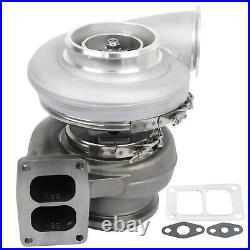
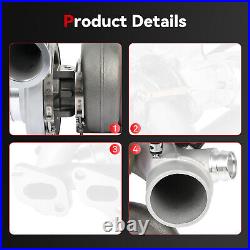
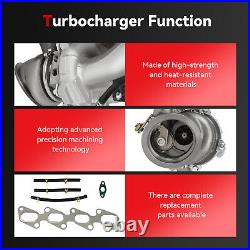
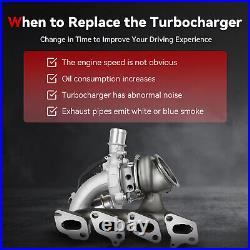
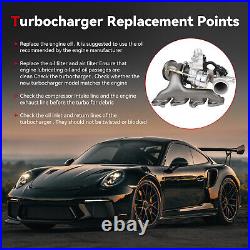


How does it work? A turbo is made up of two halves joined together by a shaft. On one side, hot exhaust gasses spin the turbine that is connected to another turbine which sucks air in and compresses it into the engine. This compression is what gives the engine the extra power and efficiency because as more air can go in the combustion chamber, more fuel can be added for more power. Common causes of Turbocharger failure. Turbochargers spin at upwards of 100,000 rpm, if there’s oil in the engine, what would cause the turbo to be starved of oil. Turbocharger Turbo For Detroit Diesel Series 60 12.7L 2585837C91 14030407-108. Here’s a few reasons that can lead to, or cause oil starvation. Lack of oil changes. Oil feed line issues. A few things to keep in mind when dealing with heat. Protect the engine bay. Over time carbon deposits creep into the oil creating a sludgy abrasive lubricant that can cause premature wear to the turbo components. This wear can lead to excessive movement in the bearing assembly leading to contact of moving components in extreme examples. Engine fragments or debris that goes unnoticed is a common cause for oil contamination damage. These small metallic particles can be from previous engine failures, general wear and tear or from poorly serviced engines – All resulting in a similar outcome. Regular oil changes will offer the best counter measure against oil contamination. Hot stop/Bad driving habbits. Hot stop refers to the method of shutting down your engine without allowing the turbo to cool for a few seconds. If the engine has gotten hot it’s important to allow the turbo to spin for 30-45 seconds before shutting down to dissipate heat from the core assembly. This will allow the cooling system to do its job by removing heat soak from the turbine and CHRA assembly, preventing 900°C+ from passing into the turbo internals leading to carbonising from heat transfer. Spirited driving before the engine is warm is a more common contribution to turbo damage and engine failure. Boosting a cold engine wreaks havoc with the internal components, the rate of expansion from a cold engine which is introduced to charged air can lead to cracks! Letting your engine warm up and cool down is an important aspect of ownership, regardless of the vehicle. Whether it’s a diesel work van or a performance track car, a good warm up and cool down will prolong the life of your turbo. Signs of turbo damage. Diagnosing impending turbo doom can be hard, so here’s a couple of things to look out for. Blue smoke: Blue smoke is a sign of burning oil, if this is turbo related it will be during idle once the engine has warmed and on overrun after lift off. Loss of power: A turbo car generates a large portion of its power via the turbo, if this is damaged or worse, has stopped working, you’ll experience a significant loss of oomph. Oil leaking: Common places to find oil that are a result of a worn or damaged turbo piston rings are in the exhaust and in the intercooler pipework. Although a turbo seal is not complete seal, they should not leak excessively. A small amount of wet is acceptable if the vehicle has been sat, but with regular use, if it’s healthy, it should be dry, assuming the oil drain is clear and the breather system is working correctly, It’s a good idea to check these first. Whining & whistling: While your turbo should make satisfying whooshy sounds, a constant whistle or whining sound is not the sound of a healthy turbo. This could be anything from damaged bearings to broken compressor blades. If you experience this, it’s a good idea to get the turbo checked before any further damages arise. Excessive fuel consumption: A turbo vehicle has a precise air fuel mixture that utilises both the engine and the turbo in unison. If the turbo is not working properly, the engine can overcompensate with fuel leading to reduced MPG. Oil consumption: Without checking the turbo thoroughly, it can be difficult to diagnose worn seals. If you notice an increase in oil consumption on your turbo vehicle, it may be due to worn seals allowing oil to pass into the intake or exhaust system, but it can also be forced to leak oil from other engine related issues. How to Install a Turbocharger: A Step-by-Step Guide. Step 1: Gather Your Tools and Materials. Step 2: Disconnect the Battery. Step 3: Remove the Old Turbocharger. Step 4: Install the Turbocharger. Step 5: Connect the Exhaust and Intake Systems. Step 6: Install the Oil Supply Lines. Step 7: Connect the Intercooler. Step 8: Double-Check All Connections. Step 9: Reconnect the Battery. Step 10: Test and Tune. 23518588,2585838,23523197,23515635,23515636,23516431,2585837C91. 14030407-101,14030407-102,14030407-103,14030407-104. 14030407-105,14030407-106,14030407-107,14030407-108. OE Spec or Performance/Custom. The note there will NOT be read. The images shown are not the actual item and are for your reference only. There are NO EXCEPTIONS! OR, you may choose to have a replacement. FEEDBACK IS VERY IMPORTANT TO US. Key or key case. Spark Plug Ignition Wire. Oil Fuel Hose Line. Cylinder Head Gasket Sets. Transfer Case Shift Motor. Air suspension valve solenoid. Brake Drums & Brake Shoes. Brake Pads & Brake Shoes. Wideband Oxygen 02 O2 Sensor For 03-07 Honda Accord 2.4L Upstream Downstream. 3 Ignition Coil For Chevrolet Buick LeSabre GMC V6 3.8L 3.4L 2.2L DR39. New Starter for 5.7 5.7L 7.4 7.4L Suburban 94 95 96 97 98 99 & 8.1L (2002). For 99-07 Ford F250 F350 F450 F550 Power Heated Smoke Signal Towing Mirrors Pair. For Cadillac Escalade Radiator Coolant Overflow Tank Brand New. Fuel Pump Module Assembly For 1996 GMC Sonoma 4.3L E3920M.

